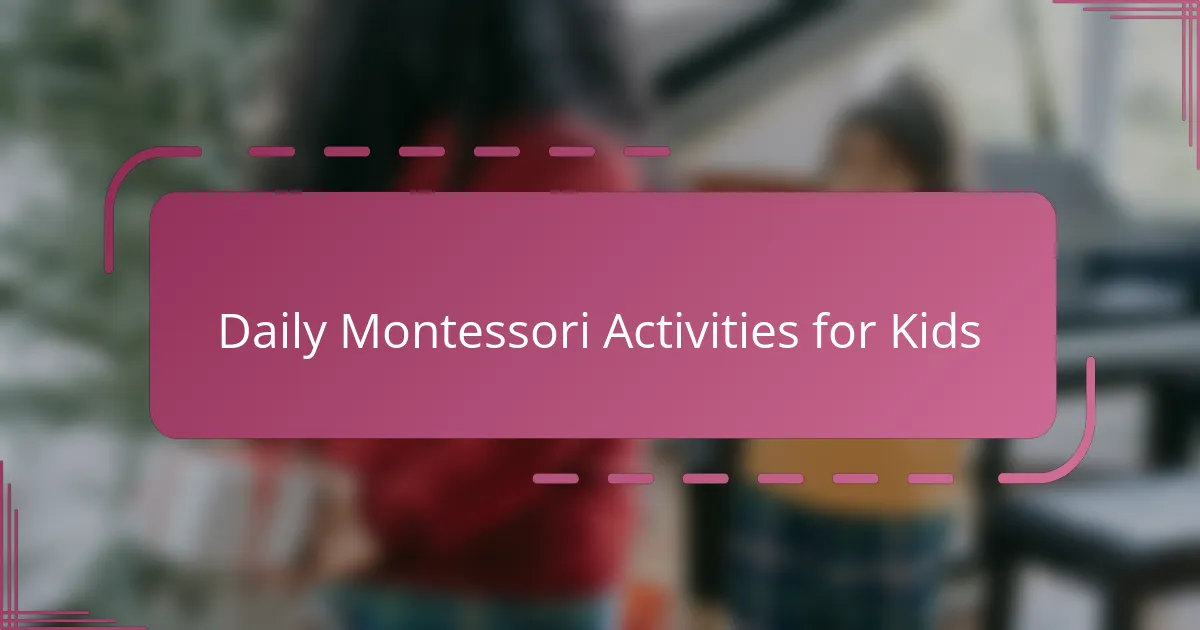Key takeaways
- Montessori parenting emphasizes respect for a child’s natural curiosity, fostering independence and problem-solving skills through a prepared environment.
- Daily activities that encourage practical life skills enhance a child’s confidence and self-reliance, showing that the process of learning is more important than the speed of completion.
- Challenges in Montessori parenting include the struggle to remain patient and resist intervening, highlighting the importance of trusting the child’s growth process.
- Consistency in Montessori practice relies on establishing routines, being patient, and involving children in maintaining their learning environment to promote ownership of their education.

Understanding Montessori Parenting Methods
Understanding Montessori parenting methods means embracing the idea that children are naturally curious and capable learners. When I first adopted this approach, I found myself stepping back more, allowing my child to explore instead of rushing to intervene. Have you ever noticed how much a child absorbs just by quietly observing their environment?
What struck me most was the emphasis on respect—respect for the child’s pace, choices, and even mistakes. It made me question traditional parenting urges to control every moment. Isn’t it powerful to think that by trusting our children, we’re actually teaching them confidence and responsibility?
Another key piece I’ve come to appreciate is the prepared environment, designed to spark independence. Creating spaces where my child can reach toys or pour water on their own has been transformative. Simple changes, but the impact on their self-esteem and problem-solving skills is profound. How often do we underestimate what a child can do when given the chance?

Key Principles of Montessori at Home
One principle that really shaped my approach was fostering independence. I remember setting up low shelves with accessible materials and watching my child make choices confidently. Isn’t it amazing how a simple change in environment can empower a little one to take charge of their own learning?
Another key idea is following the child’s interests rather than forcing predetermined activities. I used to worry whether my child was “doing enough,” but Montessori taught me to trust their natural curiosity. Have you ever paused and realized that when a child deeply engages with something of their choosing, their learning is more meaningful?
Finally, the emphasis on gentle guidance rather than control resonated with me profoundly. Allowing mistakes became a vital part of growth, not something to immediately fix. I found myself marveling at how patience and respect could nurture resilience and creativity far better than constant correction ever did.

Setting Up a Montessori Environment
Creating a Montessori environment at home felt like setting the stage for my child’s independence. I carefully chose furniture and tools that were their size—low shelves, small chairs, and accessible baskets—so everything was within reach. Have you ever seen the confidence that shines when a child can choose and use something all by themselves?
I also learned to simplify the space, removing distractions so my child could focus deeply on one activity. It wasn’t easy at first to resist filling every corner with toys, but watching my child immerse in just a few carefully selected materials made it clear. Isn’t it fascinating how less can actually be more for fostering concentration?
One moment that stayed with me was when my child proudly carried a small pitcher of water across the room without spilling a drop. Setting up that little task area wasn’t just about organization; it was about nurturing self-trust and capability. Have you noticed how these small successes build up a child’s confidence over time?

Daily Montessori Activities for Kids
I found that incorporating daily Montessori activities transformed our mornings into moments of calm and curiosity. Simple tasks like sorting beads by color or pouring water from a small jug were unexpected challenges that my child eagerly embraced. Have you ever noticed how these little successes light up a child’s face like a proud glow?
One favorite daily activity became practical life skills—folding small cloth napkins or wiping the table after snack time. At first, I worried they’d take longer than if I just did it myself, but watching my child’s determination made me realize the real value is in the process, not the speed. Isn’t it amazing how these everyday chores can build such strong foundations of independence?
Sometimes I’d set up a nature tray with leaves, stones, and pinecones for tactile exploration. I loved seeing my child’s focused gaze as they examined textures and patterns, asking questions that revealed their deep engagement. Have you experienced how these sensory activities quietly nurture a child’s observational skills and wonder for the world?

Challenges in Montessori Parenting
At times, embracing Montessori parenting felt like swimming against the current of conventional advice. I’ll admit, stepping back while my child struggled with a task tested my patience more than once. But have you noticed how those moments, though challenging, often lead to the most meaningful breakthroughs?
Another hurdle was maintaining consistency amid everyday chaos. Preparing the environment and sticking to the principles required ongoing effort, especially when life felt overwhelming. Have you ever wondered how to balance those ideals with the unpredictability of real parenting days?
Finally, it wasn’t always easy to resist the urge to intervene “just this once.” Watching my child make mistakes without rushing to fix them demanded a shift in mindset — one I’m still learning. Isn’t it remarkable how much growth happens when we let go and trust the process?

Personal Success Stories with Montessori
One moment I’ll never forget is when my child independently completed a simple puzzle after several days of quiet effort. Watching their face light up with pride made me realize how powerful Montessori methods are in fostering self-confidence. Have you ever seen a child beam with the joy of achieving something entirely on their own?
Another success was noticing how Montessori activities naturally cultivated patience, not just in my child but in me as well. Instead of rushing to solve problems, I learned to observe and support quietly—an unexpected gift that deepened our bond. Isn’t it fascinating how giving space can lead to closer connections?
I also recall a time when my child chose to spend an entire afternoon building with blocks, focusing intently without distractions. That level of engagement was new to me and underscored how following their interests fuels deeper learning. Have you experienced the magic when a child’s curiosity takes the lead?

Tips for Consistent Montessori Practice
Consistency in Montessori practice, I’ve found, comes down to routine and gentle reminders. Setting predictable times for activities helps my child feel secure and eager to engage, rather than overwhelmed. Have you ever noticed how kids thrive when they know what to expect?
Another tip is to stay patient and flexible. Some days, the environment works perfectly; other days, distractions creep in, and that’s okay. I remind myself that consistency isn’t about perfection but about returning to the principles as often as possible.
Finally, involving my child in resetting the space after activities has been a game changer. It’s not just about tidiness—it teaches responsibility and respect for their environment. When they help prepare their own space, doesn’t it also feel like they own their learning journey?


